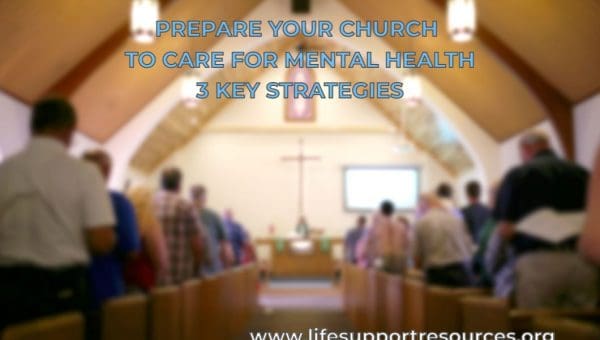Table of Contents
Preparing your church to care for mental health can be intimidating. Three mental health professionals from the LifeSupport Family share key strategies that will help you create a culture of care for mental health.
Church or ministry leaders can feel overwhelmed when juggling their pastoral duties along with caring for their congregants. Many churches have care teams or people they refer to depending on a person’s needs.
With complex mental illnesses, people are usually referred to a Christian therapist. In all cases however, the church should strive to be an active part of the community of care for those with mental illness.
At a recent LifeSupport conference, a panel of therapists addressed issues related to mental health and the church with some helpful tips for any ministry that is wanting to improve the way it handles care, aftercare, referrals and more.
Dan Munson, Susan Broadwell and Julie Hull provided a wealth of knowledge on mental health and ways the church can be a role-model for care.
Here are some of the key points.
Be a Church of Listeners
As easy as it sounds, just listening to someone talk about their struggles can have a big impact.
Susan Broadwell, one of the three therapists on the panel at the LifeSupport Conference, said listening is a very important component to being a church prepared to help those with mental illnesses.
“…to be a place of deep listening. To be looking for those individuals who are sitting in the back, or body language can often tell us a lot and what’s going on with someone. It’s not always one thing so it’s really learning how to listen for that and being prayerful about that before coming to church or events,” Broadwell said.
The other two on the LifeSupport therapist panel, Dan Munson and Julie Hull, stressed the importance of being present with those suffering.
“I would love for churches to convey the message that we are a ministry of presence. We will sit with you in that pain. It’s coming alongside you. It seems so passive and it’s so not. It is very, very powerful,” Hull said.
Munson agreed.
“There is healing in listening. Listen, and Jesus will show up,” he said.
Expand the Care Team to the Congregation
At any moment, a person in the church can come into contact with a person suffering. The panel of therapists all agreed that training is important to equip more people so the church, as a whole, can be ready to help when the time comes.
“I think the training is essential,” Broadwell said. “People can see that anyone is capable of walking alongside someone who is grieving or going through any kind of emotional suffering, or any suffering for that matter.”
Churches have all kinds of programs, including care programs, but the therapists wanted to see churches be more open to welcoming those suffering, rather than just placing them in a program.
“I feel like we are a culture that wants to fix it,” Julie Hull said. “We want to have a program, we want to have a design, we want to have the next steps to get to that healing place and it’s not linear. It’s all over the place and it’s crazy, but if the church could provide the message saying, ‘We care, we are going to come alongside you.’”
Utilize Mental Health Professionals
There may be a number of mental health professionals in your church that you are not even aware of. They could be valuable in helping those suffering.
“There should be a plan in place where you are well informed about the therapists in the congregation,” Broadwell said. “What are their areas of expertise? What are they willing to do on a moment’s notice? Are they available for referrals outside of church? I think having conversations about that in advance would be helpful with a more immediate response when the need arises.”
Churches can also utilize those with similar experiences to help others who are suffering in a number of areas…suicide, homicide, an illness or death. By pairing these people together, one that has already walked that road with someone who is just beginning, can bring the proper support to someone hurting.
“Those are things where there is a deeper level of empathy that really cannot be described,” Hull said.
View a video of the LifeSupport Conference therapist panel here – https://youtu.be/6VZqPZXv99A
Our library of short mental health discussion videos help equip lay-persons to talk about mental health topics.

